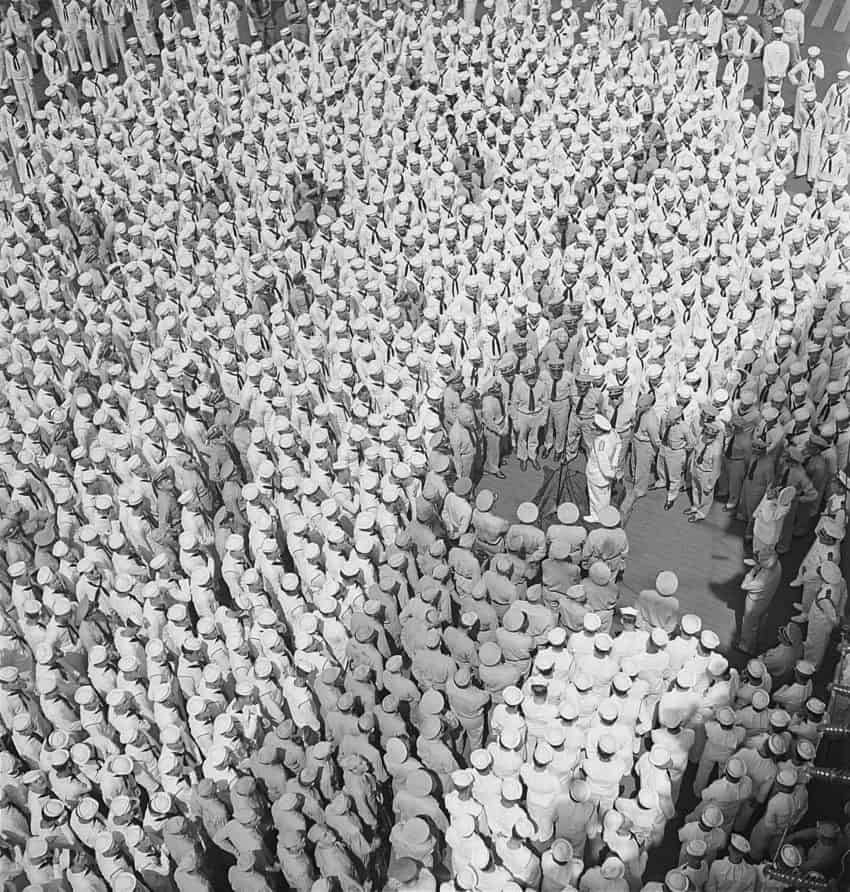
Adm. Lord Louis Mountbatten, center right, addresses personnel aboard the USS Saratoga at Trincomalee, Ceylon. Mountbatten took control of Allied operations in Southeast Asia after the first Quebec Conference in Canada. Click to enlarge. For a full enlargement of this picture, click on this link.
By: Phil Kohn. Dedicated to the memory of his father, GM3 Walter Kohn, U.S. Navy Armed Guard, USNR, and all men and women who have answered the country’s call in time of need. Phil can be contacted at ww2remembered@yahoo.com.
British Prime Minister Winston Churchill, U.S. President Franklin D. Roosevelt and Canadian Prime Minister William Lyon Mackenzie King on August 13, 1943, kick off the weeklong First Quebec Conference, in Canada. Agreement is reached on several points. Britain reaffirms U.S. control over the Pacific theater, where operations are intensifying. Further Chindit operations are proposed for Burma, and aid to Chiang Kai-shek in China will continue. British Vice Adm. Lord Louis Mountbatten will take charge of the Southeast Asia Command. Fighting in Italy will be intensified to capitalize on Mussolini’s downfall. Churchill, Roosevelt and King also adopt British Lt. Gen. Sir Frederick Morgan’s plan for a cross-Channel invasion, to be called “Operation Overlord,” scheduled for May 1, 1944. Floating artificial ports (Mulberry Harbours) will be built in Great Britain and towed to the French beaches, to be used until French ports are taken. The supreme commander for the invasion will be a senior U.S. general. Elsewhere, in the first Allied air raid over Austria, American planes bomb Wiener Neustadt, 38 miles south of Vienna.
The Italian government declares Rome an open city on August 14, meaning it will not be defended against an invading army, to protect its populace and prevent further destruction. In Asia, U.S. B-24 Liberator heavy bombers fly from Australia to execute a raid over Borneo, striking Japanese oil reserves at Balikpapan.
On August 15, 34,000 American and Canadian troops invade Kiska Island in the Aleutians — and encounter no resistance whatsoever. Having lost nearby Attu Island to the Americans and the Canadians on May 30, the Japanese had surreptitiously withdrawn all 5,200 of their troops from Kiska during several severely foggy days at the end of July. Despite finding the island abandoned, four soldiers are killed by Japanese landmines, and another 24 are killed by “friendly fire” on heavily fog-blanketed Kiska. In the Pacific, the Land Battle of Vella Lavella Island, Solomons Group, begins. It is part of “Operation Cartwheel,” the move against Japan through the Central Pacific. Landings are also made on New Georgia and Arundel Islands.
U.S. forces on August 16 enter Messina in northeastern Sicily in a final push to clear the island. The evacuation of 100,000 Italian and German troops from Sicily is completed. In Occupied Poland, units of the Waffen-SS surround the Jewish ghetto in Białystok, intending to deport Jews living there to concentration camps. As was the case in Warsaw in April, they are met by Jewish resistance fighters, who battle the Nazis for five days before being overwhelmed.
In Sicily, on August 17, the two Allied commanders, Montgomery and Patton, enter Messina. The island is now wholly in Allied hands. The shelling of the Italian mainland from Messina begins. Over Germany, 597 RAF bombers attack Peenemünde on the Baltic coast. The raid kills 792 people and delays V-2 rocket testing. Simultaneously, 376 B-17s and B-24s of the U.S. Eighth Air Force carry out double raids, against the ball-bearing plants at Schweinfurt and the Messerschmitt fighter works at Regensburg. Over the course of the mission, 80 aircraft are lost. In the Solomon Islands, the Japanese successfully evacuate 9,000 soldiers from New Georgia to Kolombangara.
The U.S. Fifth Army Air Force makes heavy air attacks on the Japanese airfields at Wewak, on the north coast of Papua-New Guinea on August 18, with 215 Japanese planes destroyed against the loss of just six American aircraft. President Roosevelt issues an executive order that cancels draft deferments of any workers striking at a defense plant who do not comply with an order of the War Labor Board to return to work. The last of 48,500 Jews deported from Thessaloniki, Greece, arrives at Auschwitz.
Allied forces take the Japanese strongpoint of Mount Tambu, near Salamaua on Papua-New Guinea on August 19. The Japanese are now wedged into a small area. The First Quebec Conference generates an agreement among the U.S., the United Kingdom and Canada regarding “tube alloys” (a code name for atomic weapons). The three nations agree to combine the work and findings of their researchers and scientists towards development of an atomic weapon and agree that the weapon will not be used without the joint consent of the three. In Lisbon, neutral Portugal, secret negotiations begin between the Allies and the Italians over Italy’s surrender.


